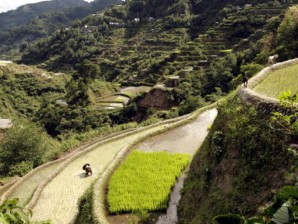BAGUIO CITY—Environment officials are asking President Benigno Aquino to subsidize the maintenance of the Ifugao rice terraces by hiring farmers to oversee farms that have been abandoned by families seeking greener pastures outside the province.
Clarence Baguilat, Cordillera director of the Department of Environment and Natural Resources (DENR), told the Regional Development Council’s sectoral committee on economic development on Tuesday that the upkeep of the terraces has been taxing the resources of the Ifugao government.
“Many of the terraces have been abandoned. Many have been left to nature. In fact, there are more wild vegetation now on the farms,” Baguilat said.
The Ifugao government took over the maintenance of the rice terraces when former President Macapagal-Arroyo dissolved the Banaue Rice Terraces Task Force (BRTTF) in 2002.
The task force, formed by former President Joseph Estrada in 1999, replaced the Ifugao Terraces Commission (ITC) that was created in 1994 to oversee the rehabilitation and restoration of the centuries-old terraces.
In 1995, the rice terraces in Batad, Bangaan, Mayoyao, Hungduan and Nagacadan were inscribed by the United Nations Educational, Scientific and Cultural Organization (Unesco) as World Heritage Sites.
But Baguilat said Executive Order No. 158, which former President Fidel Ramos issued to form the ITC, orients the management of the terraces toward enhancing their tourism potentials, instead of their importance to agriculture.
Hailed for its hydrological engineering when Ifugao elders carved the farms by following the contours of the mountains, the rice terraces require both a social and a technical support system that takes into account the unique irrigation system still working today, Baguilat said.
Government has failed to discourage young Ifugaos from leaving for the cities to seek employment, abandoning the farms they inherited from their parents.
The terraces have deteriorated to a state where they have been listed by Unesco as endangered heritage sites.
Erratic weather worsened the condition of the terraces. A long drought in 2010 left parched terraced farms to the mercy of heavy rains this year, leading to massive landslides that still need repairs, Baguilat said.
Ifugao Rep. Teodoro Baguilat Jr. has been soliciting support from international donors to fund the terraces’ restoration since the national government virtually abdicated its responsibility over the heritage sites.
It is the government that is obliged to preserve the terraces, documents showed.
Rep. Baguilat was the governor who undertook the terraces’ preservation when the government task force ceased to exist.
DENR’s Baguilat said Malacañang could consider following a trust fund model used by countries like Japan to preserve their agricultural wonders.
“Everything [required to preserve the rice terraces of Japan] is subsidized by government to ensure that the practice remains indigenous and [untainted] by modern technology,” he said.
The Philippines, however, could hire farmers, discourage them from abandoning their terraces or encourage them to maintain farms abandoned by their neighbors, he said.
He said this approach is similar to forest management contracts that encourage indigenous forest dwellers to preserve and protect watersheds in exchange for a government fee.
“We could help the farmers by helping market their produce, but their production is too small to make any real difference,” said DENR’s Baguilat.
Another United Nations agency, the UN’s Food and Agriculture Office, has stepped in to offer technology that would preserve the terraces in Hungduan, Baguilat said. Vincent Cabreza, Inquirer Northern Luzon


